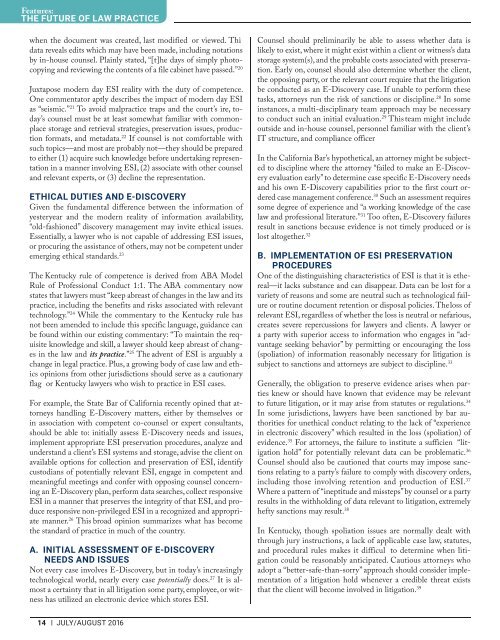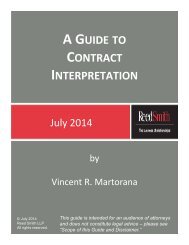you AND your spouse
BB_0716
BB_0716
You also want an ePaper? Increase the reach of your titles
YUMPU automatically turns print PDFs into web optimized ePapers that Google loves.
Features:<br />
THE FUTURE OF LAW PRACTICE<br />
when the document was created, last modified or viewed. Thi<br />
data reveals edits which may have been made, including notations<br />
by in-house counsel. Plainly stated, “[t]he days of simply photocopying<br />
and reviewing the contents of a file cabinet have passed.” 20<br />
Juxtapose modern day ESI reality with the duty of competence.<br />
One commentator aptly describes the impact of modern day ESI<br />
as “seismic.” 21 To avoid malpractice traps and the court’s ire, today’s<br />
counsel must be at least somewhat familiar with commonplace<br />
storage and retrieval strategies, preservation issues, production<br />
formats, and metadata. 22 If counsel is not comfortable with<br />
such topics—and most are probably not—they should be prepared<br />
to either (1) acquire such knowledge before undertaking representation<br />
in a manner involving ESI, (2) associate with other counsel<br />
and relevant experts, or (3) decline the representation.<br />
ETHICAL DUTIES <strong>AND</strong> E-DISCOVERY<br />
Given the fundamental difference between the information of<br />
yesteryear and the modern reality of information availability,<br />
“old-fashioned” discovery management may invite ethical issues.<br />
Essentially, a lawyer who is not capable of addressing ESI issues,<br />
or procuring the assistance of others, may not be competent under<br />
emerging ethical standards. 23<br />
The Kentucky rule of competence is derived from ABA Model<br />
Rule of Professional Conduct 1:1. The ABA commentary now<br />
states that lawyers must “keep abreast of changes in the law and its<br />
practice, including the benefits and risks associated with relevant<br />
technology.” 24 While the commentary to the Kentucky rule has<br />
not been amended to include this specific language, guidance can<br />
be found within our existing commentary: “To maintain the requisite<br />
knowledge and skill, a lawyer should keep abreast of changes<br />
in the law and its practice.” 25 The advent of ESI is arguably a<br />
change in legal practice. Plus, a growing body of case law and ethics<br />
opinions from other jurisdictions should serve as a cautionary<br />
flag or Kentucky lawyers who wish to practice in ESI cases.<br />
For example, the State Bar of California recently opined that attorneys<br />
handling E-Discovery matters, either by themselves or<br />
in association with competent co-counsel or expert consultants,<br />
should be able to: initially assess E-Discovery needs and issues,<br />
implement appropriate ESI preservation procedures, analyze and<br />
understand a client’s ESI systems and storage, advise the client on<br />
available options for collection and preservation of ESI, identify<br />
custodians of potentially relevant ESI, engage in competent and<br />
meaningful meetings and confer with opposing counsel concerning<br />
an E-Discovery plan, perform data searches, collect responsive<br />
ESI in a manner that preserves the integrity of that ESI, and produce<br />
responsive non-privileged ESI in a recognized and appropriate<br />
manner. 26 This broad opinion summarizes what has become<br />
the standard of practice in much of the country.<br />
A. INITIAL ASSESSMENT OF E-DISCOVERY<br />
NEEDS <strong>AND</strong> ISSUES<br />
Not every case involves E-Discovery, but in today’s increasingly<br />
technological world, nearly every case potentially does. 27 It is almost<br />
a certainty that in all litigation some party, employee, or witness<br />
has utilized an electronic device which stores ESI.<br />
Counsel should preliminarily be able to assess whether data is<br />
likely to exist, where it might exist within a client or witness’s data<br />
storage system(s), and the probable costs associated with preservation.<br />
Early on, counsel should also determine whether the client,<br />
the opposing party, or the relevant court require that the litigation<br />
be conducted as an E-Discovery case. If unable to perform these<br />
tasks, attorneys run the risk of sanctions or discipline. 28 In some<br />
instances, a multi-disciplinary team approach may be necessary<br />
to conduct such an initial evaluation. 29 Thisteam might include<br />
outside and in-house counsel, personnel familiar with the client’s<br />
IT structure, and compliance officer<br />
In the California Bar’s hypothetical, an attorney might be subjected<br />
to discipline where the attorney “failed to make an E-Discovery<br />
evaluation early” to determine case specific E-Discovery needs<br />
and his own E-Discovery capabilities prior to the first court ordered<br />
case management conference. 30 Such an assessment requires<br />
some degree of experience and “a working knowledge of the case<br />
law and professional literature.” 31 Too often, E-Discovery failures<br />
result in sanctions because evidence is not timely produced or is<br />
lost altogether. 32<br />
B. IMPLEMENTATION OF ESI PRESERVATION<br />
PROCEDURES<br />
One of the distinguishing characteristics of ESI is that it is ethereal—it<br />
lacks substance and can disappear. Data can be lost for a<br />
variety of reasons and some are neutral such as technological failure<br />
or routine document retention or disposal policies. Theloss of<br />
relevant ESI, regardless of whether the loss is neutral or nefarious,<br />
creates severe repercussions for lawyers and clients. A lawyer or<br />
a party with superior access to information who engages in “advantage<br />
seeking behavior” by permitting or encouraging the loss<br />
(spoliation) of information reasonably necessary for litigation is<br />
subject to sanctions and attorneys are subject to discipline. 33<br />
Generally, the obligation to preserve evidence arises when parties<br />
knew or should have known that evidence may be relevant<br />
to future litigation, or it may arise from statutes or regulations. 34<br />
In some jurisdictions, lawyers have been sanctioned by bar authorities<br />
for unethical conduct relating to the lack of “experience<br />
in electronic discovery” which resulted in the loss (spoliation) of<br />
evidence. 35 For attorneys, the failure to institute a sufficien “litigation<br />
hold” for potentially relevant data can be problematic. 36<br />
Counsel should also be cautioned that courts may impose sanctions<br />
relating to a party’s failure to comply with discovery orders,<br />
including those involving retention and production of ESI. 37<br />
Where a pattern of “ineptitude and missteps” by counsel or a party<br />
results in the withholding of data relevant to litigation, extremely<br />
hefty sanctions may result. 38<br />
In Kentucky, though spoliation issues are normally dealt with<br />
through jury instructions, a lack of applicable case law, statutes,<br />
and procedural rules makes it difficul to determine when litigation<br />
could be reasonably anticipated. Cautious attorneys who<br />
adopt a “better-safe-than-sorry” approach should consider implementation<br />
of a litigation hold whenever a credible threat exists<br />
that the client will become involved in litigation. 39<br />
14<br />
| JULY/AUGUST 2016



